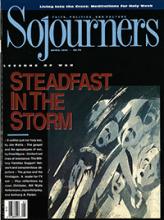Despite media reports to the contrary, significant differences exist between the 1991 anti-war movement and that of the 1960s. Protesters today are organizing against a policy they believe is wrong while trying to support the soldiers who are carrying out the policy. Much of the credit for this subtle but important difference goes to the Military Families Support Network, an organization opposed to the Gulf war which is made up of people with relatives serving there.
On August 23, 1990, soon after U.S. troops were ordered into the Middle East, Alex Molnar wrote an open letter to President Bush in The New York Times titled "If My Marine Son Is Killed." A professor at the University of Wisconsin-Madison, Molnar mailed a letter and launched a movement. He is national co-chair of the Military Families Support Network.
Beth Rosales, a longtime activist from the Philippines, has a brother in the Army Reserves. His number came up, and now he's in the Gulf. Once again Rosales is demonstrating her opposition to a destructive U.S. foreign policy, this time through her involvement in the Support Network.
Judy Davenport is national co-chair and South Carolina state chair of the Military Families Support Network. She delivered the following testimony before Rep. Lane Evans' (D-Ill.) House forum on January 14, 1991, the day before the war began.
Both Molnar and Rosales were interviewed in mid-February by Bob Hulteen, who himself has a nephew, Lance Corp. Matthew Johnson, currently in California awaiting orders to be sent to the Gulf.
'If My Marine Son is Killed'
An Interview with Alex Molnar
Read the Full Article

